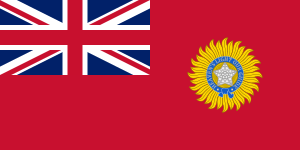Richard Smith (East India Company officer)
Brigadier-General Richard Smith (baptised 1734 – 3 July 1803) was Commander-in-Chief, India of the East India Company (Bengal).
Richard Smith | |
|---|---|
| Born | baptised 1734 |
| Died | 3 July 1803 |
| Allegiance | |
| Service/ | British Army |
| Rank | Brigadier-General |
| Commands held | Indian Army |
Early life
He was the eldest son of John Smith, cheesemonger, of Jermyn Street, St. James’s, in what is now central London.[1]
Military career
He served in India as an ensign in the Madras Army in 1752, rising to the rank of captain.[1] In 1761 returned to London and became a prominent shareholder in the East India Company.[1]
When he went out to India again in 1764 it was as Colonel of one of the East India Company's three brigades.[1] In 1767 he was promoted to Commander-in-Chief, India.[2] He was made Brigadier-General in 1768 before retiring in 1770.[3]
Political career
In 1774 he went into politics as Member of Parliament for Hindon, later serving as MP for Wendover in 1780 and as MP for Wareham in 1790.[1] He was appointed High Sheriff of Berkshire for 1779–80.[3]
He became notorious as a nabob, one of the Englishmen returned from India with considerable wealth, and may have served as a "type" for Samuel Foote's 1772 play of that title. He was satirically attacked by a Captain Joseph Price and a portrait of him appeared opposite that of Elizabeth Armistead (one of the favourite courtesans, and eventually the wife, of Charles James Fox) in Town and Country Magazine. He gambled huge amounts, on horses and at cards, and is said to have lost heavily to Fox.[1]
Family and descendants
He lived at Chiltern Lodge near Hungerford in Berkshire.[1] In 1756 he married Amelia Hopkins, the daughter of master mariner Captain Charles Hopkins. His Oxford Dictionary of National Biography entry says only that the couple had a son and a daughter, without naming them.[1] The History of Parliament contains a biography both for him, stating that in 1780 he purchased a seat at Wendover for an unnamed son,[4] and for a John Mansell Smith, which says he was the only son of Richard Smith.[5]
References
- Richard Smith at Oxford Dictionary of National Biography
- The Bengal almanac, for 1827, compiled by S. Smith and Co., Page XX
- "SMITH, Richard (1734-1803), of Harley Street, Mdx. and Chilton Lodge, Hungerford, Berks". History of Parliament Online. Retrieved 29 June 2013.
- "SMITH, Richard (1734-1803), of Chilton Foliat, Wilts". History of Parliament. Retrieved 20 October 2016.
- Cannon, J.A. "SMITH, John Mansell (b. ?1758), of Chilton Foliat, Wilts". History of Parliament. Retrieved 20 October 2016.
| Military offices | ||
|---|---|---|
| Preceded by Lord Clive |
Commander-in-Chief, India 1767–1770 |
Succeeded by Sir Robert Barker |
| Parliament of Great Britain | ||
| Preceded by Thomas Dummer |
Member of Parliament for Wendover 1780–1784 With: John Mansell Smith |
Succeeded by Robert Burton |
| Preceded by John Calcraft |
Member of Parliament for Wareham 1790–1796 With: Lord Robert Spencer |
Succeeded by Charles Ellis |
.svg.png)
